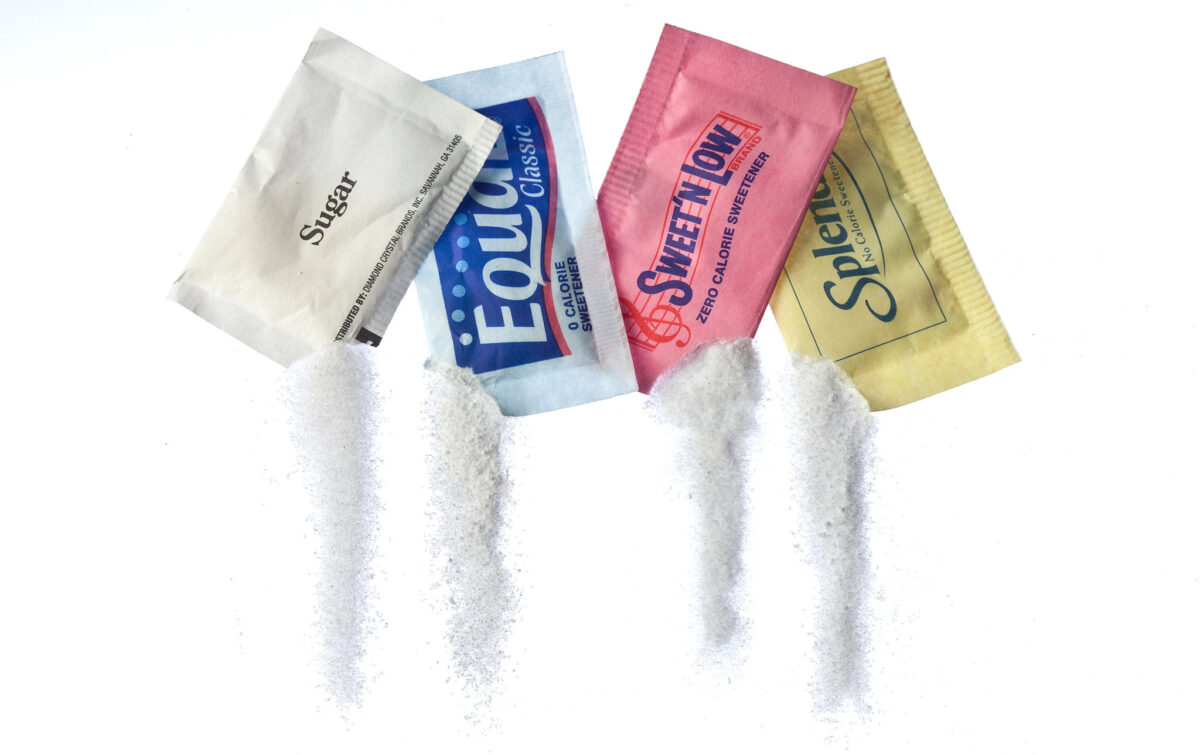By Dr. Tamara Kung, ND
Many of us are becoming increasingly aware of the harmful effects of excess sugar on our health. Much of the conversation I hear today around healthier eating, is that people are actively trying to reduce their sugar consumption or are worried about their insatiable sugar cravings. The most common goal for this is in trying to prevent conditions like diabetes, obesity, cancer, and cardiovascular disease.
The effects of too much sugar in our diet are strongly associated with these conditions above, collectively known as “Metabolic Disease”. Sugar can also lead to acne, eczema, gas, bloating and unsatisfying poops, insomnia, low mood, lack of focus, and even anxiety.
Enter artificial sweeteners – the questionable heroes designed to save the day by letting us indulge our sweet tooth without the health pitfalls of sugar. Too good to be true?
The Sweet Science: How Do They Work?
Artificial sweeteners, like saccharin, aspartame, erythritol, sucralose, and steviol glycosides (found in Stevia), are cunning sugar impostors. They mimic sugar’s sweet taste but bring little to no calories to the party. How do they do it? These compounds are hundreds, sometimes thousands, of times sweeter than sugar. So, a little goes a long way, calorie-wise.
Despite having virtually zero calories, artificial sweeteners still light up our dopamine reward systems, satisfy the sugar cravings, and studies show they still raise insulin. In an experiment on groups of diabetics, researchers found that the group that had artificial sweeteners became more insulin resistant (the problem of diabetes got worse). The way this can happen is that when our tongue tastes something sweet, it sends a message to our digestive system to “prepare for the sugar load!” As a result, insulin gets released, ready to receive and deal with the incoming sugar. This is what worsens insulin resistance.
The concern about this is that the brain is still wired to crave intensely sweet foods. Our brains can’t tell the difference between plain table sugar, and stevia, super sweet is still super sweet. While less calories can lead to some weight loss, the cravings and habits remain unchanged, meaning healthy eating habits are not established and maintaining weight loss is still a battle. The battle, guilt, shame, and fear of eating remains.
In fact, observational studies show that while switching to artificial sweetener from sugar keeps blood sugars stable, people who consume the largest quantities tend to become more obese, develop diabetes, and cardiovascular disease. What this tells us is that relying on artificial sweeteners won’t curb our cravings for sugar and can instead increase our intake for processed foods since increased appetite is common among those who consume artificial sweeteners.
Safety Check: But are Artificial Sweeteners Actually Harmful?
The million-dollar question: Are artificial sweeteners safe? Extensive research, including studies conducted on humans, has shown that artificial sweeteners, when consumed within recommended daily limits, are generally safe for most people.
Artificial sweeteners in general don’t get absorbed, and they can end up in our colon where our gut bacteria will eat them instead. This is what produces gas in us humans – the fermentation of undigested food. So, common side effects of artificial sweeteners are excess gas and bloating, as well as a shift in the types of bacteria we grow in our gut (often in the direction of a less favourable ecosystem).
Erythritol & Cardiovascular Disease?
Studies done on this specific sweetener found an increased correlation between erythritol measured in people’s blood and cardiovascular events like heart disease and stroke. However, erythritol is also produced by our own bodies when we consume sugar, so the conclusions drawn here are not necessarily the most accurate. People who generally eat more sugar may be the same people consuming more artificial sweeteners as a healthier option. A study like this doesn’t clearly tease out the specific reason for elevated cardiovascular risk. More technical and long-term studies need to be done on erythritol before we can effectively make an informed decision on whether it has a place in our foods or not.
The Exception to the Rule: Phenylketonuria (PKU)
There is an exception – aspartame contains phenylalanine, which can be harmful to individuals with phenylketonuria (PKU), a rare genetic disorder. People with PKU must closely monitor their aspartame intake and consult with healthcare professionals.
Artificial sweeteners are rigorously evaluated by food safety authorities worldwide, such as the FDA and EFSA. These evaluations consider scientific data, including animal and human studies, to establish acceptable daily intake (ADI) levels, well below the levels that could pose health risks.
In a nutshell, artificial sweetners are safe for most people when consumed on occasion. I think it can be OK to use artificial sweeteners for a birthday cake, or holiday dessert, but not something I am comfortable recommending for daily consumption. Artificial sweeteners can offer a sweet alternative to sugar, and can be a sweet escape once in while, but for those seeking to evolve themselves and evolve their cravings for more nourishing foods, reliance on artificial sweeteners won’t help.
Instead, opt to reset your sweet tooth threshold to be satisfied with all fresh and frozen fruit because this is the sweet stuff you can enjoy to your heart’s content! Believe it or not, when you take a break from sugar and artificial sweeteners, foods like raspberries and blueberries will start to be delightfully enjoyable and just sweet enough 🙂
Reference:
Kris-Etherton P.M. et. al. Nutrition and behavioral health disorders: depression and anxiety. Nutrition Reviews, 79(3), p. 247-260. doi: 10.1093/nutrit/nuaa025
Kose J, Cheung A, Fezeu LK, Péneau S, Debras C, Touvier M, Hercberg S, Galan P, Andreeva VA. (2021). A Comparison of sugar intake between individuals with high and low trait anxiety: results from the NutriNet-Santé Study. Nutrients, 13(5), p 1526. doi: 10.3390/nu13051526
Mathur K, Agrawal RK, Nagpure S, Deshpande D. (2020). Effect of artificial sweeteners on insulin resistance among type-2 diabetes mellitus patients. J Family Med Prim Care, 9(1):69-71. doi: 10.4103/jfmpc.jfmpc_329_19.
Mazi TA, Stanhope KL. Erythritol: An In-Depth Discussion of Its Potential to Be a Beneficial Dietary Component. Nutrients. 2023 Jan 1;15(1):204. doi: 10.3390/nu15010204. PMID: 36615861; PMCID: PMC9824470.


